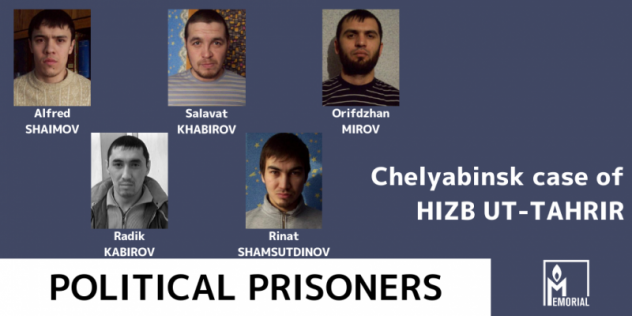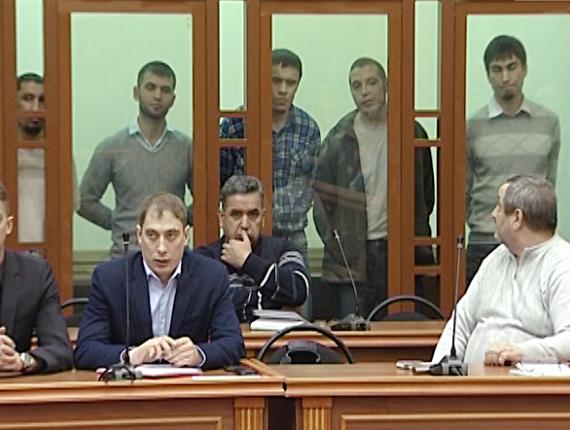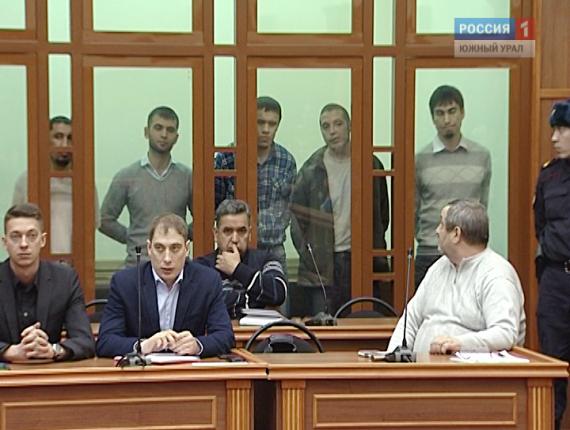Five Muslims from Chelyabinsk convicted for involvement in Hizb ut-Tahrir are political prisoners
In 2016 five Muslims received sentences ranging from 5.5 to 17 years in prison on charges of participation in a terrorist organisation and preparation of a violent takeover of power, although there was no evidence of inciting any kind of violence in the case
Memorial Human Rights Centre considers Salavat Khabirov, Alfred Shaimov, Radik Kabirov, Orifdzhan Mirov and Rinat Shamsutdinov to be political prisoners, in accordance with our guidelines defining the term. We believe the five Muslims were prosecuted on political grounds in connection with their non-violent exercise of the rights to freedom of conscience, religion, expression and association in order to consolidate and preserve the position of those currently in power. According to information available to us, they were deprived of liberty in the absence of evidence of any offence and in violation of the right to a fair trial. Memorial calls for the immediate release of Khabirov, Shaimov, Kabirov, Mirov and Shamsutdinov.
Who are the five persons convicted and what were they accused of?
On 1 October 2014 law enforcement officers detained four Muslims in Chelyabinsk — Salavat Khabirov, Alfred Shaimov, Orifdzhan Mirov and Rinat Shamsutdinov — on suspicion of involvement in the Islamic organisation Hizb ut-Tahrir al-Islami, banned in Russia. Radik Kabirov was detained on 23 April 2015.
They were all charged under Article 205.5 of the Russian Criminal Code: Salavat Khabirov and Alfred Shaimov were accused of organising the activities of a terrorist organisation (Article 205.5, Part 1, of the Russian Criminal Code), while Radik Kabirov, Orifdzhan Mirov and Rinat Shamsutdinov were accused of participating in the same organisation (Article 205.5, Part 2, of the Russian Criminal Code).
Subsequently, all five were additionally charged with preparing to seize power by violence (Article 30, Part 1, in conjunction with Article 278 of the Russian Criminal Code). This is how the investigation interpreted the Muslims’ desire to revive the Islamic Caliphate.
On 4 February 2016 Moscow District Military Court sentenced Salavat Khabirov and Alfred Shaimov to 17 and 16 years in a strict regime penal colony, respectively. Radik Kabirov was sentenced to six years in a strict regime penal colony. Orifdzhan Mirov and Rinat Shamsutdinov each received 5.5 years in a strict regime penal colony.
Why does Memorial consider them political prisoners?
As in most other prosecutions for involvement in the banned Hizb ut-Tahrir, in the case of the five Muslims from Chelyabinsk no information about or, indeed evidence of, their involvement in any terrorism-related activities, or involvement in any violent acts or incitement of violence, was presented in court.
A key witness for the prosecution was a police officer who had secretly infiltrated the group and recorded all meetings and telephone conversations of the defendants. The prosecution relied on psychological and linguistic evaluations of the texts of these ‘wiretaps.’
At the same time, the conversations quoted in the experts’ evaluations refute rather than confirm the charges of terrorism. The defendants talk about non-violent religious and political activity, condemn terrorist attacks, and discuss the territories of the supposed future caliphate (which do not include Russia or countries in the West) and the need to take into account the opinions and religion of the residents of the country in which they live. But the experts and the courts arbitrarily manipulated these texts to fit the charges laid against the five Muslims.
The Chelyabinsk prosecution clearly demonstrated the desire of law enforcement agencies to link Hizb ut-Tahrir with the threat of terrorism using fabricated evidence and media campaigns to discredit the defendants. In 2010 Khabirov had already been sentenced to a term in prison for his involvement in Hizb ut-Tahrir.
Although the charges were brought under anti-extremism rather than anti-terrorism law, Khabirov’s case was accompanied by a noisy propaganda campaign about his alleged preparation of terrorist attacks in Chelyabinsk. Although the charge of preparing terrorist attacks ‘fell apart’ in court and was dropped and Khabirov was convicted of extremism, law enforcement officials and the press chose not to advertise this fact.
 The second prosecution was also accompanied by ‘leaks’ to the press about weapons and drugs found in the possession of the Muslims who had been remanded in custody. On this occasion, none of the defendants were charged either with possessing weapons or drugs. Nevertheless, the press continued to write about these alleged activities even after the verdict.
The second prosecution was also accompanied by ‘leaks’ to the press about weapons and drugs found in the possession of the Muslims who had been remanded in custody. On this occasion, none of the defendants were charged either with possessing weapons or drugs. Nevertheless, the press continued to write about these alleged activities even after the verdict.
The real activities of Khabirov, Shaimov, Kabirov, Mirov and Shamsutdinov were limited to discussing religious texts and praying together.
The charges of terrorism are based solely on involvement with Hizb ut-Tahrir al-Islami, which is recognised as a terrorist organisation and banned in Russia. Memorial Human Rights Centre has repeatedly stated its disagreement with the decision of the Supreme Court to designate Hizb ut-Tahrir al-Islami a terrorist organisation.
The Supreme Court decision of 14 February 2003 that banned a large group of Islamic organisations, including Hizb ut-Tahrir, cited no evidence of the organisation’s terrorist activities and included only three sentences dealing with Hizb ut-Tahrir itself.
However, since November 2013, when Article 205.5 (organisation of the activities of a terrorist organisation and participation in such activities) was introduced into the Criminal Code, the mere act of joining an organisation or participating in its activities became sufficient for a conviction of a terrorist offence which carries severe penalties up to life imprisonment. Thenceforth, it was no longer necessary to prove the preparation or conduct of terrorist crimes. At the same time, it should be remembered that Article 28 of the Russian Constitution guarantees ‘freedom of conscience, freedom of religion, including the right to profess individually or collectively any religion or not to profess any, to freely choose, have and disseminate religious and other beliefs and act in accordance with them.’
According to the list maintained by Memorial, at least 315 people have either been convicted or are currently being prosecuted in connection with their involvement with Hizb ut-Tahrir.
To find out more about this case, to read extracts from the expert evaluations and court rulings and our more detailed arguments, read the full dossier on Memorial’s website.
Recognition of an individual as a political prisoner does not imply Memorial Human Rights Centre agrees with, or approves of, their views, statements, or actions.
How you can help
You can support all political prisoners by donating to the Fund to Support Political Prisoners of the Union of Solidarity with Political Prisoners via PayPal, using the e-wallet at helppoliticalprisoners@gmail.com.



